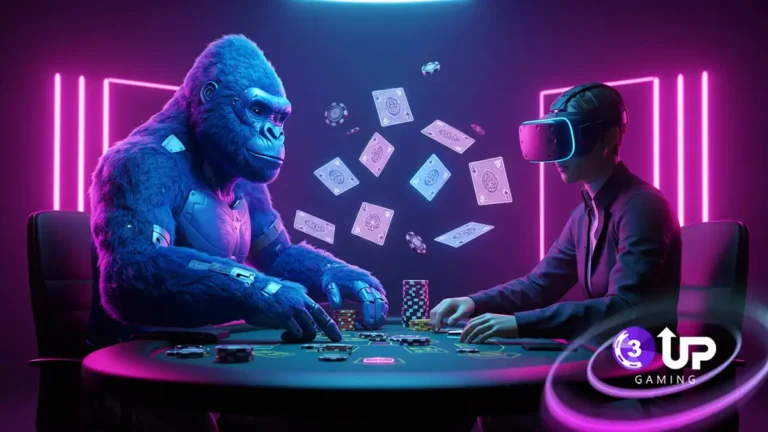AI vs Humans: Who Wins at Poker in 2025? In 2025 the question is no longer can AI play poker but how well can it beat the competition. In 2025, it’s moved way beyond, can AI play poker? That ship has sailed. It’s now about how well does it beat the best?
In under a decade AI has gone from playing basic betting patterns to beating humans at master level No-Limit Hold’em. What was once a theoretical exercise is now available in online casinos, poker training platforms and even poker tournaments.
The best poker engines calculate probabilities, run virtual simulations of millions of possible hands and revise plans in real-time, all in a matter of milliseconds and without emotion or fatigue. Humans used to rely on intuition, psychological manipulation and bluffs. Now they have to face a new harsh reality.
This article explores the gaps between man and machine, the journey AI took from being a gimmick to being an opponent and the advantages that still lie with humans. Has the poker world created the most clever AI opponent or is humanity stronger than we thought?
AI vs Humans Who Wins at Poker in 2025?
As we move deeper into 2025, the battle between AI and human players in online poker is more intense than ever. Artificial Intelligence has reached a level where it can analyze millions of hands, adapt strategies in real time, and exploit weaknesses that even experienced players might overlook. AI-powered bots are not only capable of beating casual players but are also outperforming professionals in certain formats, especially in heads-up and limit hold’em scenarios. These advancements have pushed online poker platforms to enhance fairness and transparency across their networks.
Despite the rise of poker bots and AI tools, human players still hold a unique edge in certain aspects of the game. Intuition, psychological tactics, and unpredictable gameplay remain strong advantages that AI struggles to replicate fully. Many professional players are now using AI as a training tool rather than viewing it as an adversary. In 2025, the poker world is witnessing a hybrid evolution—where AI enhances performance and strategy, but the thrill, creativity, and emotion of poker remain rooted in the human experience.
The Evolution of AI in Poker: 2015 to 2025
The material we have really takes us back about a decade, showing this incredible acceleration. If you look at the early days, say maybe 2015 to 2018, AI in poker was pretty basic. You had simple decision trees, probability calculations that were, well, rudimentary compared to now.
Early Days (2015-2018)
The first try at AI in poker combined basic decision trees with a simple probability engine. These early tools were inflexible and always followed their patterns, never adjusting to their opponents.
A big win came when Libratus at Carnegie Mellon University beat many top pros at heads-up No-Limit Hold’em in 2017, which people thought couldn’t happen. Unlike others, Libratus used real strategies that adapted as needed by getting ahead of opponents through self-play and systems that learned on the go.
AI Poker Breakthroughs (2019-2022)
Two years later, Pluribus was crowned the 2019 face-champion of AI and multiplayer poker. This AI really made waves with the game dominating in six-player games with hidden information and fluid dynamics.
Before long, a wave of software would follow. These included solver based learning and reinforcement algorithms. The result was that humans got to math-based reasoning to address the game.
In The Thick Of Niche Tool Takeover (2023–2025)
Jump to 2025, and AI now plays a key role in poker training, analysis, and big-money tournaments. The market brims with tools like Ruse AI and Poker Genius that work out answers for on-the-spot hand assessment and odds modeling.
All the average players now have some AI that tries to make them mimic GTO (game theory optimal) tactics, while the systems keep an eye on them to spot weaknesses. What once boosted human skill has now changed what it means to play competitive poker.
Milestones: How AI Mastered No-Limit Hold’em
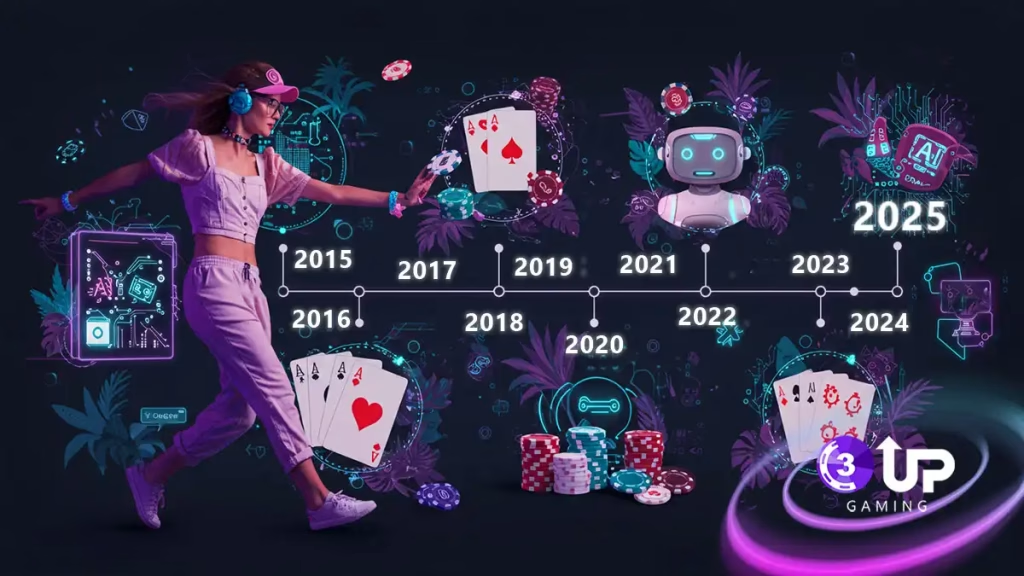
Milestone: Libratus beats Elite Pros (2017)
What truly transformed the poker world was the event in 2017 when Libratus, an AI poker bot, competed against some of the best No-Limit Hold’em players to ever take the felt. These matches took place over a staggering 120,000 hands, all of them dealt in real time and at top speeds. To win even a small percentage of all those hands, an AI needed to not just be good but to be great.
What made Libratus so impressive was not just its victory but its utter unpredictability. Top human players found themselves “bluffed in ways no human would ever bluff” and “trapped by unorthodox betting patterns.”
And, above all, Libratus showed that AI could outsmart and outplay even in games that require real psychological skill and unorthodox trickery. The breakthrough didn’t just prove that AI could play poker. It proved that AI had the power to transform the game itself.
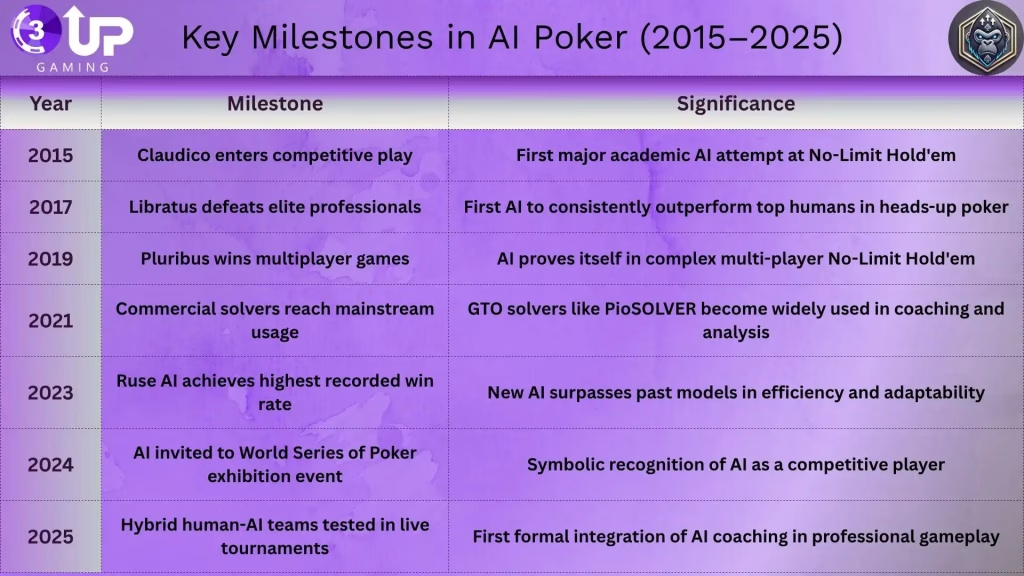
Walk on the line by: How to Buy Real Money Poker Apps Safely
More on that in Risks of Using RTA Software for Professional Poker Players
Compare this with: Poker Site Rules Regarding the Use of RTA Software
Top AI Poker Engines Competing in 2025
While AI can simulate optimal play through vast probability matrices, the act of folding a hand based on an opponent’s subtle emotional tremor remains uniquely human. It’s not just about the cards; it’s about the unspoken, the momentary read, the tilt that seeps through a poorly hidden sigh. That’s where the human eye still dominates the silicon gaze.
AI poker-playing programs have advanced from research projects to killer opponents. Come 2025 and there are four major systems existing in this field of 4 playing that specialise in a particular form of gaming-like, ranging from heads-up battles to multiple adversary tables. Here’s how they compare:
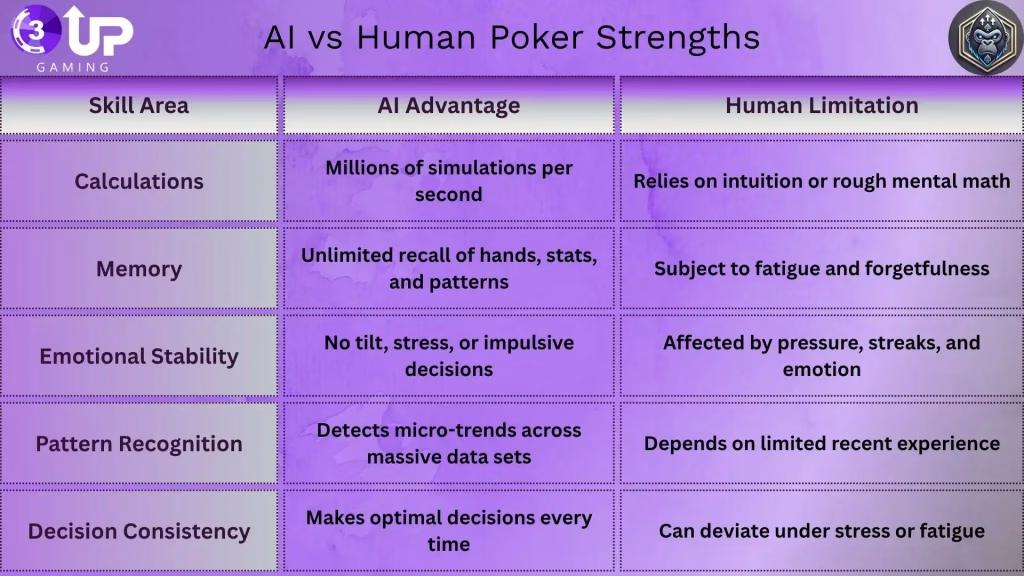
These engines are not just tools, they are redefining the state-of-the-art of what poker mastery is supposed to look like. While Libratus and Pluribus paved the way, Ruse AI now leads in practical performance, and Poker Genius provides behind-the-scenes learning for many top players.
Yet paradoxically, these same machines that cannot feel are now among our best teachers in understanding what to feel and when to override it. Rather than treating AI as the enemy, many players now treat it as a sparring partner, an ever-rigorous mentor that sharpens their intuition, not replaces it.
Capture what you need with: Bitcoin Poker Sites to Trust in 2025
Want smarter decisions? Bitcoin Poker UI Wins Big in 2025
Strengths of AI Poker: Precision, Memory, and Patience
Speed
AI can process probabilities and expected values faster and deeper than any human. In one decision it can consider millions of outcomes and adjust its strategy to maximize long term gain – all without hesitation or second guessing.
Data Retention and Analysis
AI never forgets. It stores and analyzes millions of hand histories, player tendencies and strategic patterns. In one decision it can consider millions of outcomes and adjust its strategy to maximize long term gain – all without hesitation or second guessing.
Emotional Detachment
Perhaps AI’s biggest edge is its emotional neutrality. It doesn’t tilt, chase losses or bluff out of ego. It’s constant and disciplined and almost immune to psychological pressure which is a common weakness for human athletes.
Where Humans Still Excel: Psychology and Adaptability
Reading Opponents
Humans do enjoy a considerable edge on this point, however. In spite of the brute force of AI, we can read tells. Things like body language, hesitation, conversational behaviour or even bet timing go a long way towards creating a psychological profile that good players can take advantage of. In live games particularly, this is largely out of reach of most AI systems.
Adaptive Strategies
Humans are versatile when it comes to mixed strategies or when in situations admitting all possibilities. AI is limited to well defined decision making scenarios that do not require any improvisation. While strategic adjustments are best applied in tournaments with different dynamics or player styles.
Emotional Intelligence
Players who have a good understanding of tilt in themselves and conclave how this may affect others could be one to a bluff when the opponent looks tired or fold when suddenly focused. These so-called soft skills which are based on experience and intuition are still quite beyond even the best poker AIs.
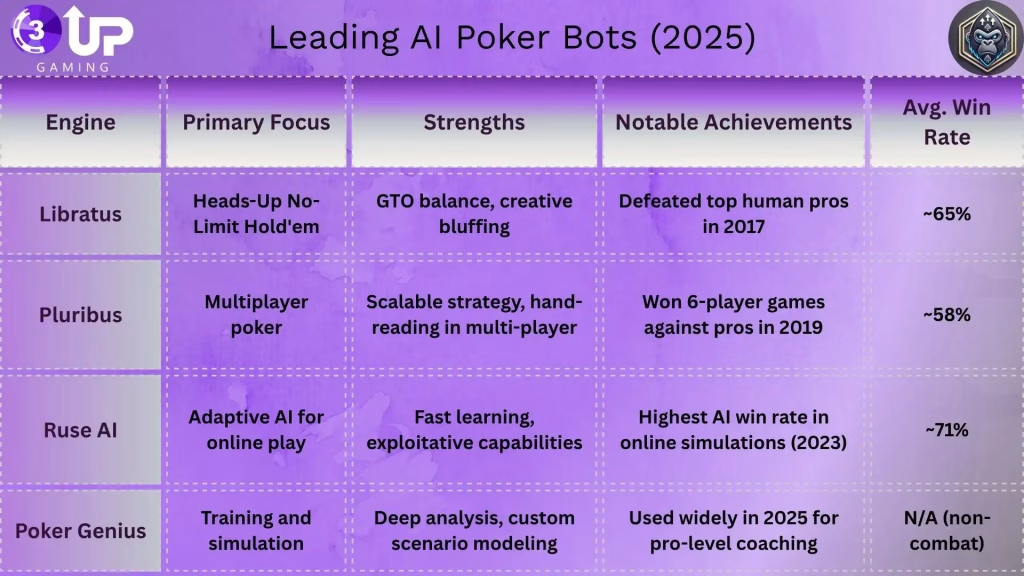
Real-World Tournaments Featuring AI vs Human Matches
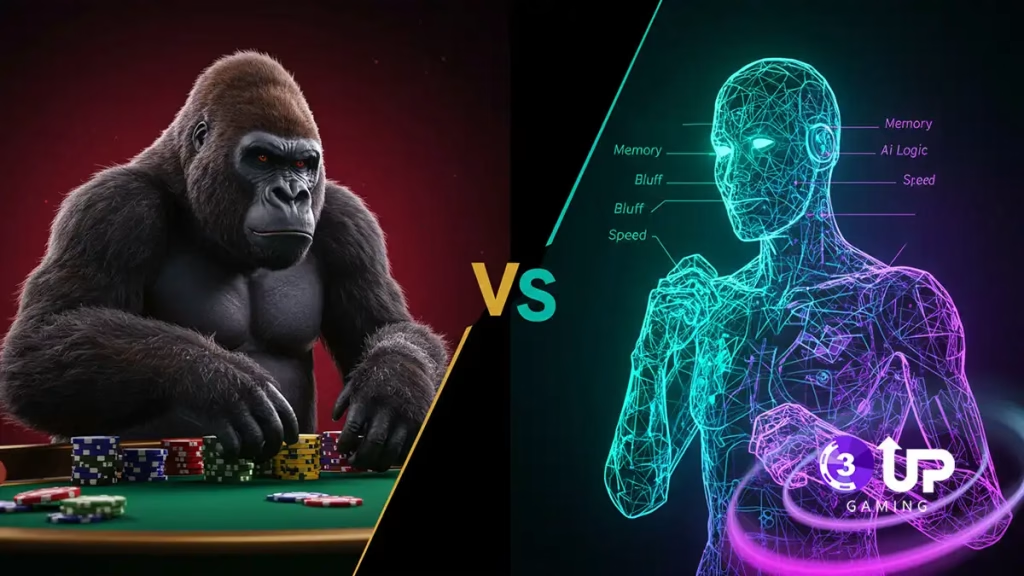
From wet-lab experiments to the HDTV arenas of big-time competitive venues in live tournaments, interest in the skills of AI has grown tremendously over time. These matches serve as the showcase: really not just in terms of performance but also from how humans psychologically respond to the very idea of playing machines.
The 2023 iteration of the AI v. Human Invitational pitted top online pros against state-of-the-art poker bots in an eerily controlled environment. This in itself was demonstration of an AI winning justly without undue means.
Another year passed in the Global Poker AI Challenge, which introduced the complications of multi-table, multi-opponent form where AI opponents could propagate their strategies across many domains. This definitely prompted the question: how do we tally any score in AI-human mixes?
The biggest change, though, arrived in 2025 when the WSOP held the first-ever AI Showdown. This event did much more. It brought into the public eye the acknowledgment that AI has now earned a seat at the table with human experts and AI engines playing side-by-side to attain what is now prevailing in this era of: co-learning.
Boost your game with: The Best White Label Poker Software Providers for 2025
Read more about: Unique Traits to Make Poker NFT Characters Stand Out
The Role of AI in Training and Analyzing Poker Hands
AI Training Tools
In 2025, AI poker training software will become indispensable for serious players. Tools like PioSOLVER, GTO Wizard, and newer neural-network-based systems offer simulations of optimal play across thousands of hand scenarios.
These tools compute not just Game Theory Optimal (GTO) strategies but also adjust to real world player adjustments, so players of all profiles can find the leaks in their game. Today, evolved AI platforms combine interactive drills and probabilistic decision trees with live feedback during practice sessions to create the most intuitive and immersive training ever.
Hand Analysis and Feedback
Of course, the most modern AI systems nowadays can break down poker hands with much more precision. The tool reads hand histories and grades whether the player’s decision is following statistical best practices. Evaluating calling frequencies, bluffing rates and positional win-rates gives a snapshot of every time you misplay or miss an opportunity.
These short, data-driven feedback loops far exceed the usual ways we develop today because these are immediate answers that allow just in time course correction, the ability to detect pattern errors immediately and for an individual user to develop their judgment, in a highly nuanced manner at speeds much faster than traditional means.
Personalized Coaching
Poker coaching has been a place where AI, in addition to transforming actual poker play based off of the computer program used fits ten years ago, is now essential too. One of which is no longer leaning on exclusively human mentors as players now have access to personalized AI poker coaching that adapts to their style and skill level.
They can monitor your long-term performance, recommend how you should change strategies and even plan personal growth paths. If you are a tight-aggressive grinder or an extremely experimental bluffer, AI is designed to learn from your tendencies and help develop the perception filters required for disciplined balanced decision-making.
Sharpen your tactics with: Rent a Poker App: Flexible & Cost-Effective Solutions
Don’t miss this: Full Comparison of Top Poker Bots in 2025
Explore further: Your Gateway to Gaming Biz
Can AI Fully Replace Human Strategy and Instincts?
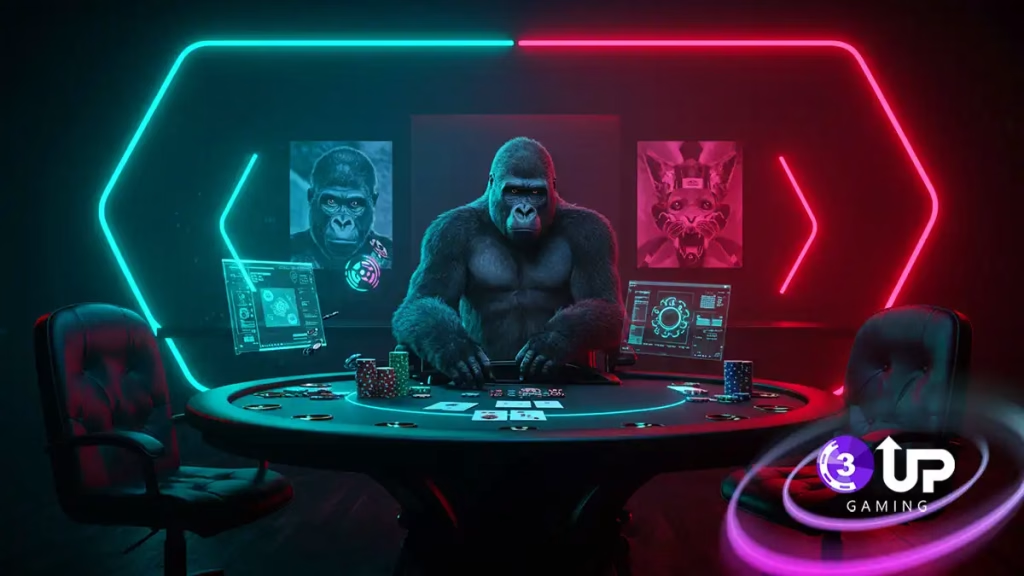
Limitations of AI in poker
Despite its immense power, there are several limitations when it comes to AI in poker:
- AI does not have emotional awareness: AI doesn’t know about tilt or other emotions it can use to manipulate opponents.
- Even the most sophisticated AI poker engines function in a limited environment and lack the creative intuition which sometimes top human players use to make decisions that can be called crazy.
- Contextual rigidity: Bots work on data and choke in unique, high pressure situations.
- Legal and Ethical barriers: Full AI integration in competitive play is restricted by most poker sites.
The Human Element
Adding the fine, situational awareness that is part of the nuanced psychological game:
- Reading physical & behavioral tells
- Understanding the dynamics and history of a table
- Adapting unpredictably to shift momentum
These are not just emotions but they are real time intuition and social intelligence which is impossible for AI to do.
Looking ahead
AI will continue to be key training and analysis tools but full replacement of human strategy is improbable. It will be a future much more of working like co-existence where:
- AI boosts preparation and review
- Humans steer in real live, adaptive situation
- Ethical rules that govern the integration into live tournaments
In succinct terms, AI can sharpen but not replace human intuition in the game of poker.
Check out: The Best Online Poker Bots Used by Pros
As we covered in Online Poker Software Compliance Standards Explained
Ethical Concerns Around AI in Competitive Poker
Perhaps the true conflict is not about who wins the hand, but who defines the nature of play: the calculative god or the dreaming gambler.
Fair Play and Integrity
The big questions on equity that AI in poker creates are:
- Unfair advantage: RTA tools give players strategic benefits that undermine the sport.
- Transparency: How do you know if a player is covertly using prohibited AI software?
- Ghosting: Even AI consultation off-table during on-line play can compromise the integrity.
The more clever AI becomes and simpler to get can make the battleground uneven.
Regulatory and Authority
AI discovery tools which bo authorities and poker sites are investing in but there are still several pitfalls:
- Evasion: Some bots try to replicate human play to escape detection.
- Delayed punishment: Only after the damage, bans or penalties are applied.
- Jurisdictional gaps: Different platforms and countries have different AI policies.
It is vital for better real-time collaboration between the regulators and the developers and operators.
Concerns about Trust
The trust among all lawful players is eroded by the wrong use of AI:
- A doubt in the back of minds on the high stake games being impacted by robots.
- Authenticity when we don’t make mistakes with AI related issues
- Players migrate to other platforms feeling that the platform is compromised.
Only when the ethical issues are directly tackled head on that the poker in 2025 will truly be competitive.
Don’t miss this: Why Do You Need Multi-Table Poker Software?
Take control with: How to Start an Online Poker Business
What the Future Holds: Coexistence or Domination?
Collaborative Environments
Rather than replacing players, AI is becoming a partner:
- Study assistants: AI helps humans refine post game analysis.
- Real-time decision modeling (in allowed formats): Adds strategy without taking over the game.
- Human-AI hybrid training: Players play against adaptive AI to learn faster.
These environments support a symbiotic future where AI enhances, not erases, human skill.
AI Dominance Scenarios
But if we don’t watch out, AI will dominate:
- Fully autonomous bots will flood online poker rooms.
- Advanced RTA will outplay humans undetected.
- Commercial AI will price out casual players from competitive play.
If AI gets too dominant it will turn poker into a computational game.
Balancing Innovation and Tradition
To save the game’s soul we need to:
- Set boundaries for AI in competition.
- Preserve human centric formats like live tournaments.
- Fair innovation that benefits all skill levels.
The future of poker will be decided by how well we balance progress with preservation.
Find your time with: Best Free Multiplayer Poker Apps to Play With Friends
Easy road that you build? Buy User-Friendly Poker Software
FAQ: about AI poker 2025
1. Has AI surpassed human players in online poker?
Yes, dozens in fact. In No-Limit Hold’em, AI bots like Pluribus and newer 2025 models outplay the average player and current Tactical Defense bots. This said, bluffing and reading emotions are still a field where humans have some edge.
2. What are the most advanced AI poker bots in 2025?
Leading the pack in 2025 are poker AI engines like PioMAX, DeepStack² and GTOx. Solvers with AI capabilities, enabling them to think real time, detect and react to bluffs, call timings and straddle plays.
3. Can human players still beat AI with enough skill?
Yes, at least in real life iterations. Even if AI has more analysis capability and memory retention; humans who can consistently catch behavioral errors, make players but go for strong hands, adapt abnormally or notice differences in AI logic, can exploit particularly where AI isn’t permitted in real-time.
4. Are AI poker tools allowed in online games?
Only in instances when not actively playing. This involves most platforms that strictly forbid any sort of Real Time Assistance (RTA). Although, tools are common for educational purposes used for evaluation and post-analysis.
5. How is AI changing poker training and coaching?
AI devices are now here to provide us with AI-based versions showing personalized feedback, GTO tools and deep hand examination. This technology and tools help players plug leaks and evaluate areas that could be improved or used to simulate tournament.

